A growing amount of companies are starting to realise that by attuning to their customer’s needs, they can grasp more opportunities for their own gain. One of these opportunities is the demand for mobile access to information regarding your company, be it regular company details or entire webshops; a trend which has brought many mobile app development tools to the market.
Post updated: April 2021
According to Gartner, “by 2020, more than 75% of enterprises will have adopted at least one mobile application development platform to accelerate their digital (and therefore mobile) business transformation strategy.” With this uprising of devices such as mobile phones, tablets, and wearables such as smartwatches, many companies have started to develop mobile apps in order to increase the ease of access to their information and/or services for their customers.
And how exactly do they accomplish this? With Mobile App Development Tools.
What are Mobile App Development Tools?
Mobile App Development Tools are software designed to assist in the creation of mobile applications. This can be accomplished in multiple ways, for example, there are native mobile app development tools, but also cross-platform mobile app development tools.
- Native mobile app development tools can help you create specialised apps that operate with ease and high quality, and can take advantage of all features on their designated platform.
- Cross-platform mobile app development tools – on the other hand – make it possible to create a generic app for multiple platforms simultaneously, greatly cutting the costs and time needed to create an app, but this comes with a trade-off. Non-platform specific applications made in a cross-platform environment tend to have more issues and lower quality compared to native applications.
*It may seem like a choice between quality or costs, so it’s best to have it all out on the table in terms of which tools you have to choose from.
Source: Business of Apps
In this article we will provide you with an overview on the best 20 Mobile App Development Tools that are available on the market.

Free White Paper: Optimising the Mobile Experience with In-App Feedback
A guide to in-app feedback for mobile product owners
and mobile marketers.
Developers can choose between different approaches to cross-platform app development, including hybrid mobile app development and rapid mobile app development (RMAD), or ‘codeless’ mobile app development. Low-code or no-code tools may appeal to organisations that don’t have the in-house knowledge and/or can’t afford to hire developers; however, the setback with these options is that they don’t allow for as much control or customisation.
In order to keep an oversight on the many platforms, the tools in this article will be separated into two categories:
- Native development tools
- Cross-platform development tools (including Coding Platforms, Low-Coding Platforms and No-Coding Platforms).
Let’s get started.
Native Mobile App Development Tools
A native development tool is a software which allows developers to create applications for use in a single particular system family, platform or device, like Android, iOS, or Windows (note: support for Windows Mobile ends in December 2019). A native app is specially made and coded for a specific mobile platform in its native programming language, these being:
- iOS (Objective-C or Swift)
- Android (Java or Kotlin)
- Windows Phone (C#)
There are different guidelines for each of these platforms and developers need to stick to them as they differ in typography, graphic styles, gestures, visual effects, data entry and more.
Let’s start with the first native mobile app development tool:
1. Xcode

Xcode introduces a new way to design and build software. Swift is an innovative new programming language for Cocoa and Cocoa Touch and, when combined with Xcode tools, makes programming a delightfully live experience. Live rendering within Interface Builder displays your hand-written UI code within the design canvas, instantly reflecting changes you type in code. Xcode includes everything developers need to create applications for Mac, iPhone, iPad, Apple TV, and Apple Watch. Xcode provides developers a unified workflow for user interface design, coding, testing, and debugging.
Starting Price: Free
Demo Available: No
Free Trial: No
Website: www.developer.apple.com/xcode
2. Android Studio

Android Studio is an Android development Software built by Google. Its implementation editor is very useful for Android developers. Android studio provides shortcuts for coding and designing and its layout designer makes it very easy to use, which helps reduce time spent on coding. Android studio also provides drag and drop features to design the layout of your projects.
Starting Price: Free
Demo Available: No
Free Trial: No
Website: www.developer.android.com/studio
3. AppCode

AppCode is an IDE for iOS/macOS development. In addition to working with Objective-C, Swift and C/C++ programming languages, it supports web technologies such as JavaScript, HTML, XML, CSS, and more. It provides a variety of valuable integrations including among others CocoaPods manager and built-in Reveal support. In addition to the benefits AppCode provides to developers (such as saving their time on automating routine tasks, locating and fixing errors, taking advantage of intelligent support from the IDE, and increasing their overall productivity), it can be an equally valuable asset for your business.
Starting Price: €8,90 per month
Demo Available: No
Free Trial: Yes, 30 days
Website: www.jetbrains.com/objc
Cross-Platform Mobile App Development Tools
With cross-platform mobile development, programmers on one platform can develop apps for one or more other platforms or mobile operating systems simultaneously. This can also enable developers to essentially use the same code base for different platforms. Meaning that such generic apps can be published and used on both an Android Phone and an iPhone. This greatly reduces the time and costs needed for creating an application, however; there are also down sides. Due to it being one and the same code base, these generic apps tend to have more platform-specific issues and a lower quality (user-interface, performance) than a native application. This of course varies per application, system and platform used.
Furthermore, this category has also been split into three platforms:
- Coding Platforms
- Low-Coding Platforms
- No-Coding Platforms
Coding Platforms
Coding platforms provide you with full control over your entire development process. The downside is that it requires knowledge over your chosen coding language. But this trade-off is undoubtedly worth it if you can streamline your app to perfection and have perfect control over your application.
4. Appcelerator

Appcelerator is a mobile app development tool which speeds up time to market with cross-platform development and testing and simplified access to date via optimised APIs. Real-time mobile analytics are available on the platform, helping to power user engagement and measure results. Appcelerator uses a single JavaScript code base for rich native mobile apps and cloud-connected mobile apps.
Starting Price: $199 per month + Free version available
Demo Available: No
Free Trial: Yes, 60 days
Website: www.appcelerator.com
5. Xamarin

Xamarin is a mobile application development platform that helps designers and developers build native iOS, Android and Windows applications using a single shared .NET code base. An Integrated Development Environment (IDE), Xamarin utilises Visual Studio Tools to build native mobile applications. The platform offers a host of features including code editing, refactoring, debugging, testing and cloud-publishing. Additionally, the platform provides access to on-demand content from Xamarin’s university curriculum and monthly Azure credit.
Starting Price: $25 per month
Demo Available: No
Free Trial: Yes
Website: www.visualstudio.microsoft.com/xamarin
6. Adobe PhoneGap

Adobe PhoneGap allows you to work with one code base, but with a different set of technologies. PhoneGap is an open source, cross-platform tool that builds apps with HTML, CSS, JavaScript, and Web APIs. A PhoneGap application is essentially a collection of HTML pages wrapped in a native app shell, which are then pushed out to native platforms via native APIs. With PhoneGap, developers create files in HTML, CSS and JavaScript—much like they would when creating a website. These files are stored in a local directory or in the cloud, then when they’re run on a device, they access device features through plugins. This makes PhoneGap apps lighter-weight and highly reusable, but they have less of a native feel, and the quality of the UI is going to depend more on the Web View engine of the operating system rendering it. Note: Adobe PhoneGap is based on Cordova technology. In fact, If you are developing a hybrid mobile app, you can either create it using proper Cordova or choose Adobe’s ecosystem for using PhoneGap distribution of Cordova.
Starting Price: Free
Demo Available: No
Free Trial: Yes
Website: www.build.phonegap.com
7. Ionic

Ionic is an easy-to-use, and easy-to-learn framework that allows for quick prototyping with a decent CLI. Integration with Angular makes for a pleasurable environment to code in. Built on standard web technology, Ionic helps teams build and ship beautiful cross-platform hybrid and Progressive Web Apps with ease. The Ionic Framework is a free, open source mobile UI toolkit for developing high-quality cross-platform apps for native iOS, Android, and the web—all from a single codebase.
Starting Price: Free
Demo Available: No
Free Trial: No
Website: www.ionicframework.com
8. React Native

Developed by the Facebook community, React Native is a cross-platform framework based on JavaScript technology. It enables developers to build enhanced and native-like apps using a single code base. The aim of this framework is to build first-rate native application experiences using JavaScript and React. This unique JavaScript technology makes possible to develop a cross-platform mobile application that looks and feels like a native one but it is coded by a single team of engineers simply using React and JavaScript.
Starting Price: Open Source
Demo Available: No
Free Trial: No
Website: www.facebook.github.io/react-native

Integrate your React Native app with Mopinion's in-app feedback SDK
We offer a number of different mobile native SDKs including Android, iOS, React Native and Cordova
9. MobiLoud
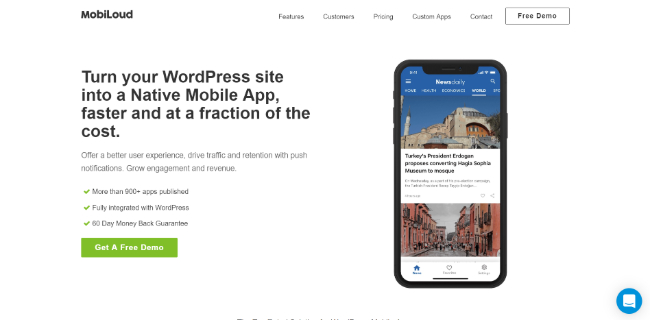
MobiLoud is a WordPress plugin that enables businesses of all sizes to create native mobile applications for iOS and Android devices. It integrates with WordPress websites to convert them into native mobile apps and allows users to publish the apps on the Apple App Store and Google Play. Features of the MobiLoud platform include performance monitoring, push notifications, external link embedding, login and subscriptions, mobile advertising, offline access and analytics. MobiLoud facilitates white label branding that helps users customize the logo, style, color, font and content within their app.
Starting Price: $319 per month
Demo Available: Yes
Free Trial: Yes, 60 days
Website: www.mobiloud.com
10. Ninox

Ninox is a cloud-based platform for building custom database applications, with solutions for Mac, iPhone, iPad, and web browsers. The platform allows users to create custom apps using built-in templates, custom actions, scripting, and drag-and-drop formulas to connect multiple databases. Custom forms, fields, and triggers can be created, and calculations can be built using the visual formula editor. Ninox can be used to create a wide variety of application types, covering event management, invoicing, customer relationship management (CRM), task management, meeting management, and more. Additionally teammates can be invited to collaborate, and users can control the permissions granted to each collaborator. Devices can be synced in real-time, allowing users to access and work on their apps from multiple devices.
Starting Price: $8.33 per month + Free version available
Demo Available: Yes
Free Trial: Yes
Website: www.ninox.com
11. Sencha

Sencha is an app development company that provides products to enable developers to create web applications for desktops, tablets, and smartphones. Its Ext JS product features high-performance UI components like Pivot Grid, D3 Adapter, HTML5 Calendar, and more. Sencha equips developers with frameworks, tools, and services to help build amazing web application experiences. With a longstanding commitment to web technologies, Sencha reduces the cost and complexity of developing and delivering enterprise applications across multiple device types.
Starting Price: $1.195 per year
Demo Available: No
Free Trial: No
Website: www.sencha.com
12. NativeScript
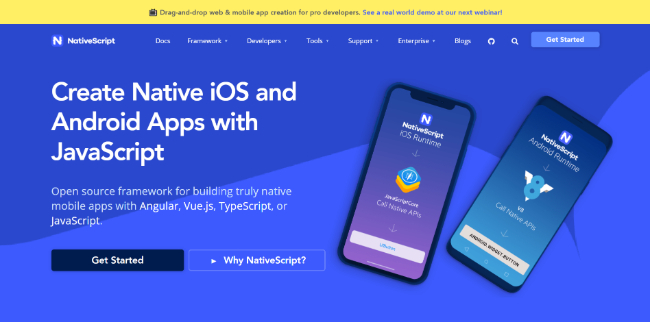
NativeScript allows you to create native iOS and Android apps, with one codebase, using the web skills you already have (JavaScript and CSS) and the libraries you already love. NativeScript is an open-source framework that builds native applications using other frameworks such as Vue.js or Angular and languages like Typescript or Javascript.
Starting Price: $19 per month + Free version available
Demo Available: Yes
Free Trial: No
Website: www.nativescript.org
13. Onsen UI
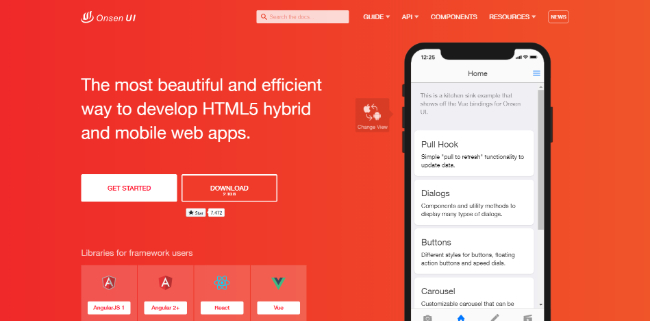
Onsen UI possesses a rich variety of UI components specially designed for mobile apps. It provides tabs, side menu, stack navigation and many other components such as lists and forms. All animations in Onsen UI have been tuned and optimised to perform well on a wide range of devices. Onsen UI is easy to learn while being a powerful tool to create complex mobile apps. Onsen UI has lots of learning resources including official documentation, an interactive tutorial and a community forum where your questions get answered.
Starting Price: Free
Demo Available: No
Free Trial: No
Website: www.onsen.io
Low-Coding Platforms
Want to make the process less time consuming? Then these low-coding platforms might be what you’re looking for. These platforms are able to efficiently streamline your development process, by limiting the amount of coding that is required. Instead the platform itself will assist you with specialized building programs, yet still allowing customisation with coding.
14. OutSystems

OutSystems is a low-code app development platform that enables users to build, deploy, manage, and change enterprise-grade mobile and web apps faster. It includes more than 140 ready-to-use user interface patterns and templates to accelerate UI development. OutSystems provides multiple kinds of support options to help its users maximise the use of the software. These include unlimited email support, knowledge base resources, online training and tutorials, exclusive webinars, and a customer on-boarding program.
Starting Price: Free
Demo Available: Yes
Free Trial: Yes
Website: www.outsystems.com
15. Fliplet

Fliplet empowers clients such as Accenture, Deloitte and Colgate to create bespoke apps such as marketing apps, training apps, sales enablement apps and internal communication apps. Fliplet offers a drag and drop interface for non-technical people to build their own bespoke apps and relieve the pressure on IT to maintain app content and infrastructure. The licence allows a user to create as many apps as they wish – one per campaign, per event or even per key client if desired. Fliplet’s enterprise clients benefit from a world class design and user experience expertise as well as proactive online support. Fliplet works with Apple, Android and Windows and meets enterprise-grade security requirements.
Starting Price: €1.300 per month + Free version available
Demo Available: Yes
Free Trial: No
Website: www.fliplet.com
16. TrackVIA
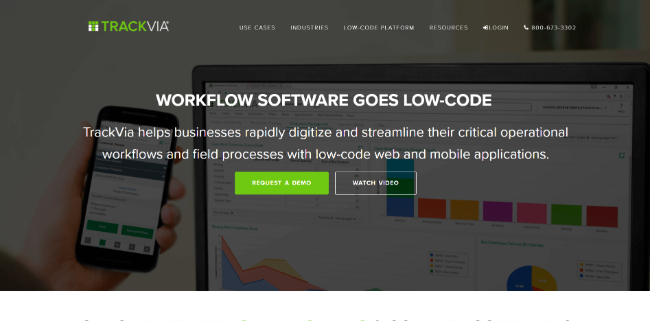
TrackVia is a low-code alternative to spreadsheets, legacy databases and complicated enterprise systems. Track, manage and automate critical business processes or operational workflows with greater efficiency, speed and ease. TrackVia does this by making it easy to collect data accurately, analyse that data in real time, and take immediate action through automated tasks, alerts or even emails. TrackVia allows you to maintain control of your application needs even without a programming background.
Starting Price: Price is not provided, contact TrackVia for current pricing information.
Demo Available: Yes
Free Trial: No
Website: www.trackvia.com
No-Coding Platforms
Even if you have no prior knowledge of coding whatsoever, these days, you can still create an app that’s perfectly suited for your company. This is made possible through the use of no-coding platforms, they provide you with services, such as, a drag-and-drop interface, allowing you to create an application without typing a line of code. The downside is that because it’s made to be simple and efficient, it removes a large chunk of customisation and flexibility that comes with coding.
17. AppSheet
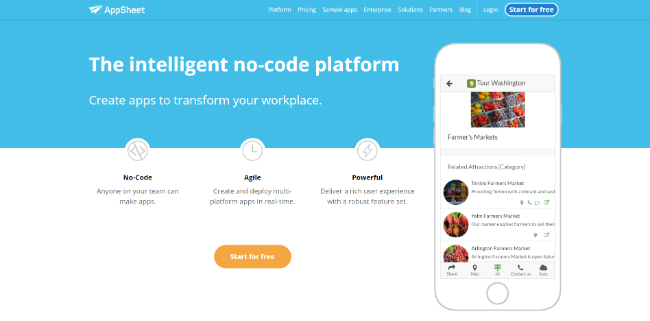
AppSheet allows anyone to build powerful mobile apps for iOS and Android apps directly from their own data sources. Data can be extracted from multiple sources, including Box, Dropbox, OneDrive, Google Drive, and Smartsheet. Once an app is created, users can then customise the branding and features offered, with a fully interactive emulator to preview the app. AppSheet offers both a basic editor and an advanced editor for app customisations. The basic editor covers the most basic and important app features and functions, such as the app logo, view controls, app name, security level and sign-in requirements, and offline functionality, as well as allowing users to directly edit spreadsheet data and reorganise spreadsheet structure.
Starting Price: $5 per active user, per month
Demo Available: Yes
Free Trial: Yes
Website: www.appsheet.com
18. Quick Base

Quick Base is an application building platform which allows users to create customised business apps with no coding required. The enterprise-ready solution offers tools including workflow automations, notifications and reminders, task management, team collaboration, interactive dashboards, and more. Quick Base includes easy web forms for fast data collection, point-and-click integration with other cloud apps and data sources, robust APIs, unlimited reports and dashboards, customisable home pages, and right-sized governance including role-based access control.
Starting Price: $500 per month
Demo Available: Yes
Free Trial: Yes, 30 days
Website: ww.quickbase.com
19. Alpha anywhere

The Alpha platform is a unified mobile and web app development and deployment environment with distinct “no-code” and “low-code” components. Using the Alpha TransForm no-code product, business users and developers can take full advantage of all the capabilities of the smartphone to turn any form into a mobile app in minutes, and power users can add advanced app functionality with Alpha TransForm’s built-in programming language. IT developers can use the Alpha Anywhere low-code environment to develop complex web or mobile business apps from scratch, integrate data with existing systems of record and workflows (including data collected via Alpha TransForm), and add additional security or authentication requirements to protect corporate data.
Starting Price: No price provided, contact Alpha Anywhere for current pricing information.
Demo Available: No
Free Trial: Yes, 30 days
Website: www.alphaplatform.com
20. BuildFire

BuildFire offers the best of both worlds, with high-end custom development capabilities as well as an easy, intuitive DIY platform. The simple, elegant drag-and-drop UI makes it easy to build your own iOS or Android application. The platform currently supports more than 10,000 apps, and is powerful and flexible enough to scale with you in order to meet your business’s needs as you grow.
Starting Price: $53 per month
Demo Available: Yes
Free trial: No
Website: www.buildfire.com
Simplify access to your mobile app services!
Creating an application for your company will greatly improve the image your customers receive of you. Don’t hesitate to try one of these 20 mobile app development software out. Most of them offer either a free version, trial, or demo, so there’s no need to make any commitments before you’re sure that’s the tool you’re going with.
IMPORTANT: Once you have your mobile app up and running, don’t forget to analyse and monitor performance. In fact, this is critical to the success of your mobile app. Luckily, there are plenty of tools you can use to do this. But be wise when choosing which one is best for your business as they all vary in functionalities. For example, are you looking to perform usability testing (through a usability tool like UserTesting) or do you want to uncover trends in customer behaviour (through a feedback software like Mopinion)?
Ready to see Mopinion in action?
Want to learn more about Mopinion’s all-in-1 user feedback platform? Don’t be shy and take our software for a spin! Do you prefer it a bit more personal? Just book a demo. One of our feedback pro’s will guide you through the software and answer any questions you may have.






